The Ultimate Guide for Introverts: How to Communicate Vulnerability Effectively in Relationships
Ever felt like your voice is lost in your relationship, especially when you’re trying to share your deepest emotions? For introverts, expressing vulnerability can be particularly challenging.
As a life coach, I’ve helped many women navigate the challenges of expressing vulnerability for introverts. I often see how hard it is for quiet individuals to communicate their needs effectively and engage in intimate conversations.
In this article, you’ll discover introvert communication strategies to express vulnerability and build deeper connections. We’ll cover active listening, using “I feel” statements, and setting clear boundaries – all essential self-disclosure techniques for reserved personalities.
Let’s dive into these authentic communication skills for shy people and explore how to overcome social anxiety in personal interactions.

Understanding the Struggles of Introverted Women in Relationships
Navigating relationships as an introvert can be challenging. Many clients initially struggle with expressing vulnerability for introverts, leading to feelings of isolation. Introvert communication strategies often fall short in conveying their deepest needs and emotions.
For introverted women, sharing their deepest feelings can be daunting. They often feel unheard or unacknowledged, which can cause significant discomfort and anxiety. Expressing emotions as an introvert becomes a hurdle in building intimate connections.
This lack of acknowledgment can erode trust over time. Vulnerability in relationships for introverts is crucial for building strong, trusting relationships, yet it’s often the hardest for introverts to convey effectively. Self-disclosure techniques for quiet individuals may help overcome these barriers.
Let’s look at this more closely.

Key Steps to Communicating Vulnerability for Introverts
Overcoming this challenge of expressing vulnerability for introverts requires a few key steps. Here are the main areas to focus on to make progress in introvert communication strategies:
- Practice active listening in conversations: This involves giving full attention, reflecting back, and validating emotions, which is crucial for building trust through vulnerability for introverts.
- Use “I feel” statements to express emotions: Clearly frame your feelings and reasons for a deeper understanding, an essential self-disclosure technique for quiet individuals.
- Set clear boundaries for response expectations: Communicate needs explicitly and agree on response timeframes, helping introverts manage vulnerability in relationships.
Let’s dive into these authentic communication skills for shy people!
1: Practice active listening in conversations
Active listening is essential for introverts to express vulnerability effectively, serving as a crucial introvert communication strategy.
Actionable Steps:
- Make eye contact and minimize distractions. Focus entirely on your partner by maintaining eye contact and eliminating any potential distractions like phones or TV, enhancing vulnerability in relationships for introverts.
- Reflect back what you hear. Paraphrase your partner’s words to confirm understanding and ask clarifying questions to deepen the conversation, a key self-disclosure technique for quiet individuals.
- Validate their feelings. Acknowledge your partner’s emotions without judgment, offering empathetic responses to show genuine support, crucial for expressing emotions as an introvert.
Explanation:
These steps help create a safe space for open communication. Engaging fully with your partner and reflecting their words back shows you value their input, fostering intimate conversations for reserved personalities.
Validating their emotions fosters trust and deeper connections. According to research on social-emotional learning, active listening can significantly improve interpersonal relationships, aiding in expressing vulnerability for introverts.
Benefits of active listening include:
- Strengthens emotional bonds
- Reduces misunderstandings
- Encourages open dialogue
These techniques will help you build stronger, more trusting relationships. Let’s move on to the next strategy for expressing vulnerability for introverts.

2: Use “I feel” statements to express emotions
Using “I feel” statements is a powerful way for introverts to clearly communicate their emotions and needs in relationships, serving as an effective technique for expressing vulnerability for introverts.
Actionable Steps:
- Identify your emotions. Take time to reflect on what you’re truly feeling. Use a feelings wheel if necessary to pinpoint specific emotions, enhancing your emotional intelligence as an introverted personality.
- Frame your statements clearly. Start with “I feel” followed by the emotion and the reason. For example, “I feel anxious when we don’t talk about our plans because I value clear communication.” This introvert communication strategy helps in building trust through vulnerability.
- Practice in low-stakes situations. Start using “I feel” statements in less contentious conversations. Build confidence gradually by practicing regularly, which is crucial for overcoming social anxiety in personal interactions.
Explanation:
These steps help introverts articulate their feelings more effectively and foster open, honest communication. Framing emotions clearly prevents misunderstandings and helps partners respond empathetically, supporting vulnerability in relationships for introverts.
This approach aligns with the trend of embracing vulnerability in relationships, as highlighted by Rosalie Haizlett.
Communicating your emotions this way will strengthen your relationship, promoting authentic communication skills for shy people.
Let’s explore the next strategy.

3: Set clear boundaries for response expectations
Setting clear boundaries for response expectations can help introverts feel more acknowledged and secure in their relationships, especially when expressing vulnerability for introverts.
Actionable Steps:
- Communicate your needs explicitly. Let your partner know how and when you need acknowledgment. For example, “I appreciate when you respond within a day to my messages about important topics.” This is a key introvert communication strategy for expressing emotions.
- Agree on a response timeframe. Collaborate to set a realistic and mutually acceptable timeframe for responses. Ensure both partners are comfortable and committed to the agreed terms, which is crucial for vulnerability in relationships for introverts.
- Revisit and adjust boundaries as needed. Regularly check in to discuss how the boundaries are working. Be open to making adjustments to better suit both partners’ needs, enhancing self-disclosure techniques for quiet individuals.
Explanation:
These steps are crucial for creating a sense of security and mutual respect in relationships. Explicit communication and agreed-upon timeframes help prevent misunderstandings and ensure both partners feel valued, facilitating intimate conversations for reserved personalities.
According to research on negotiation skills, clarity in communication can significantly enhance relationship dynamics.
Key outcomes of setting clear boundaries:
- Increased mutual respect
- Reduced anxiety and uncertainty
- Improved relationship satisfaction
By setting clear boundaries, you can strengthen your relationship and build a deeper connection with your partner, which is essential for expressing vulnerability for introverts and building trust through vulnerability.
Partner with Alleo to Communicate Vulnerability Effectively
We’ve explored the challenges of expressing vulnerability for introverts and the steps to improve communication. But did you know Alleo can make this journey easier for quiet individuals seeking to enhance their self-disclosure techniques?
Alleo offers tailored coaching support to help you master these skills, including strategies for expressing emotions as an introvert. Setting up an account is simple.
Once you’re in, create a personalized plan addressing your specific challenges in vulnerability in relationships for introverts. You’ll work with Alleo’s AI coach, who will guide you through each step of developing authentic communication skills for shy people.
Alleo’s coach will follow up on your progress in building trust through vulnerability for introverts, handle any changes, and keep you accountable with text and push notifications. You’ll get full coaching sessions just like with a human coach, focusing on emotional intelligence for introverted personalities.
Plus, you can try it free for 14 days, no credit card required.
Ready to get started for free and improve your introvert communication strategies?
Let me show you how!
Step 1: Log In or Create Your Account
To begin your journey of expressing vulnerability more effectively, log in to your existing Alleo account or create a new one to access personalized coaching support tailored to your introverted communication needs.
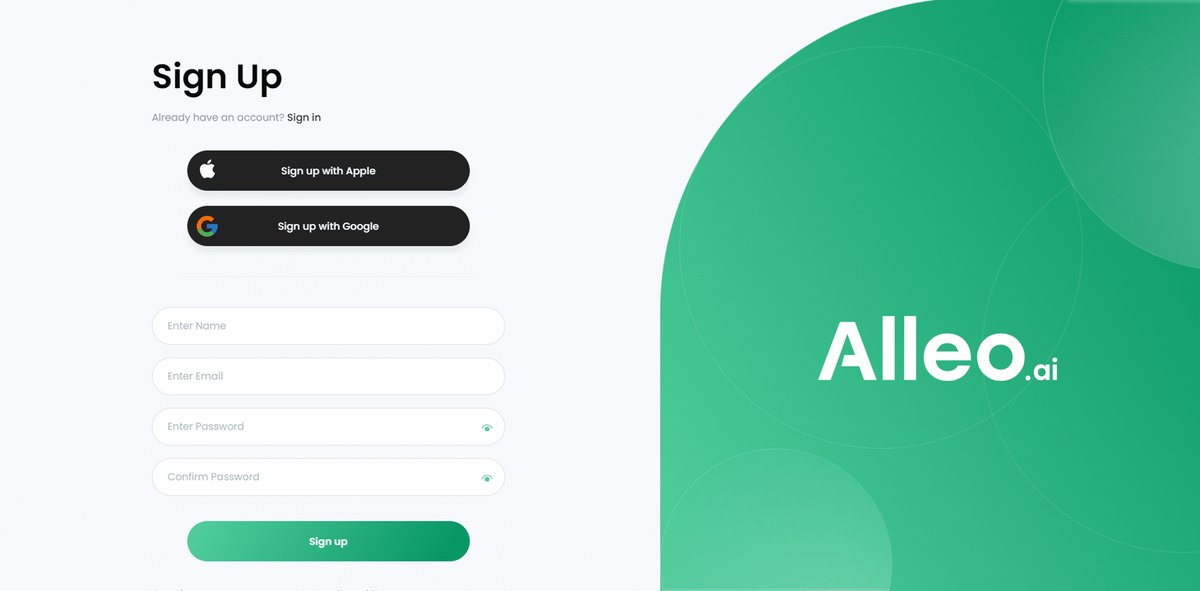
Step 2: Choose “Improving overall well-being and life satisfaction”
Select “Improving overall well-being and life satisfaction” as your goal to address the challenges of expressing vulnerability in relationships, which will help you develop better communication skills and build deeper connections with your partner.
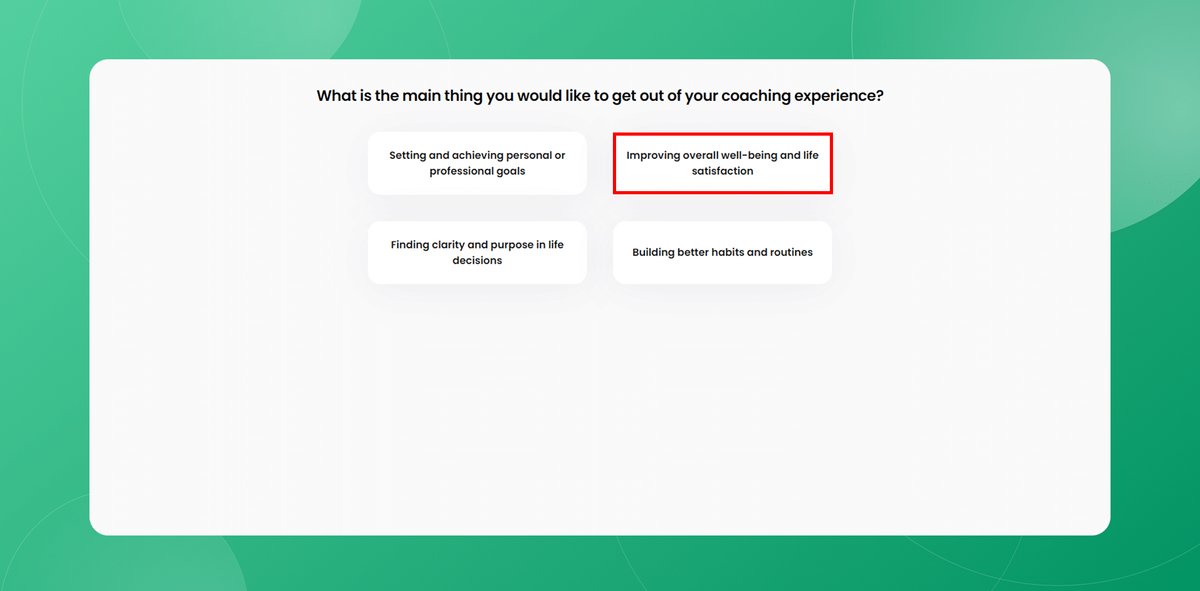
Step 3: Select “Personal” as Your Focus Area
Choose the “Personal” life area to address your communication and vulnerability challenges in relationships, aligning with the strategies discussed in the article for deeper connections and more effective expression of emotions.
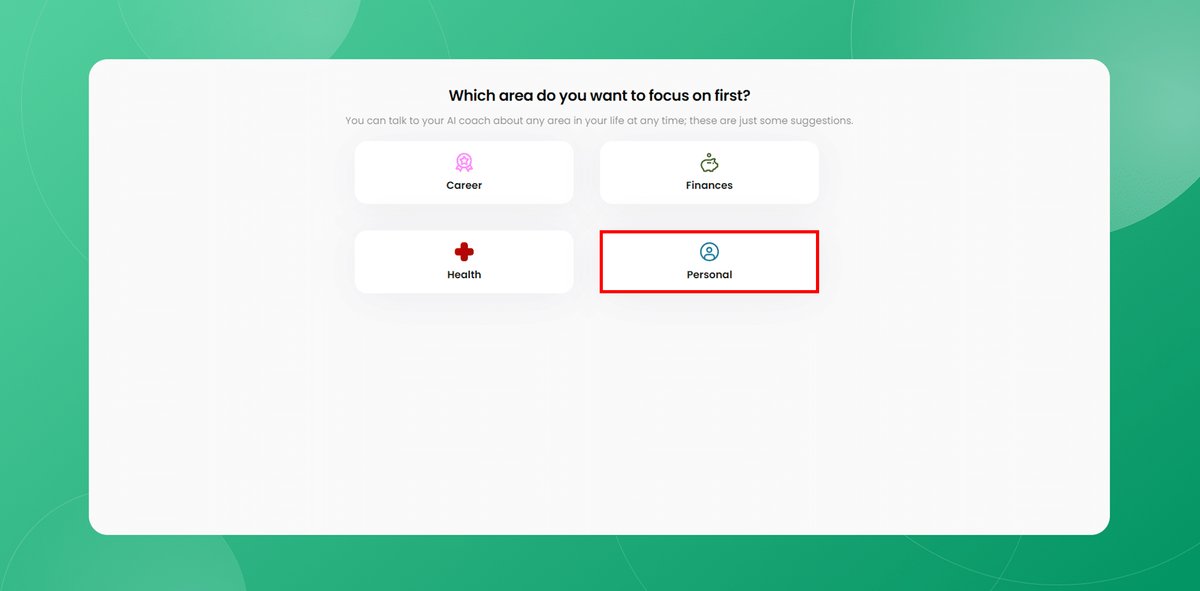
Step 4: Starting a Coaching Session
Begin your journey with Alleo by scheduling an intake session, where you’ll discuss your communication challenges and set up a personalized plan to improve your ability to express vulnerability in your relationships.
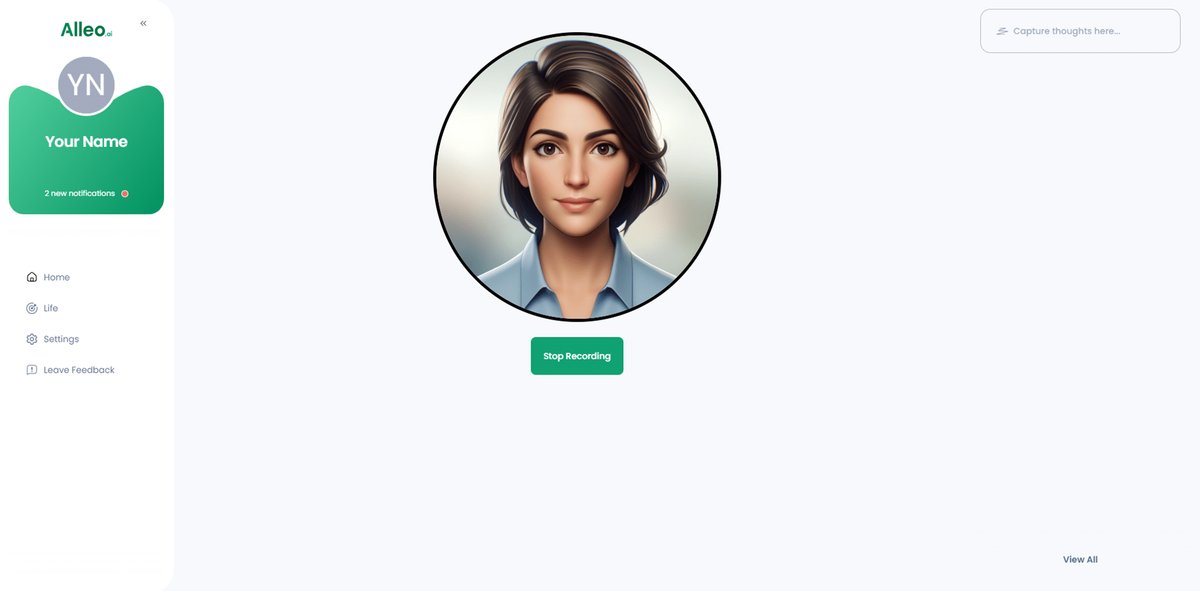
Step 5: Viewing and managing goals after the session
After your coaching session, check the Alleo app’s home page to review and manage the vulnerability-related goals you discussed, helping you stay on track with improving your communication in relationships.
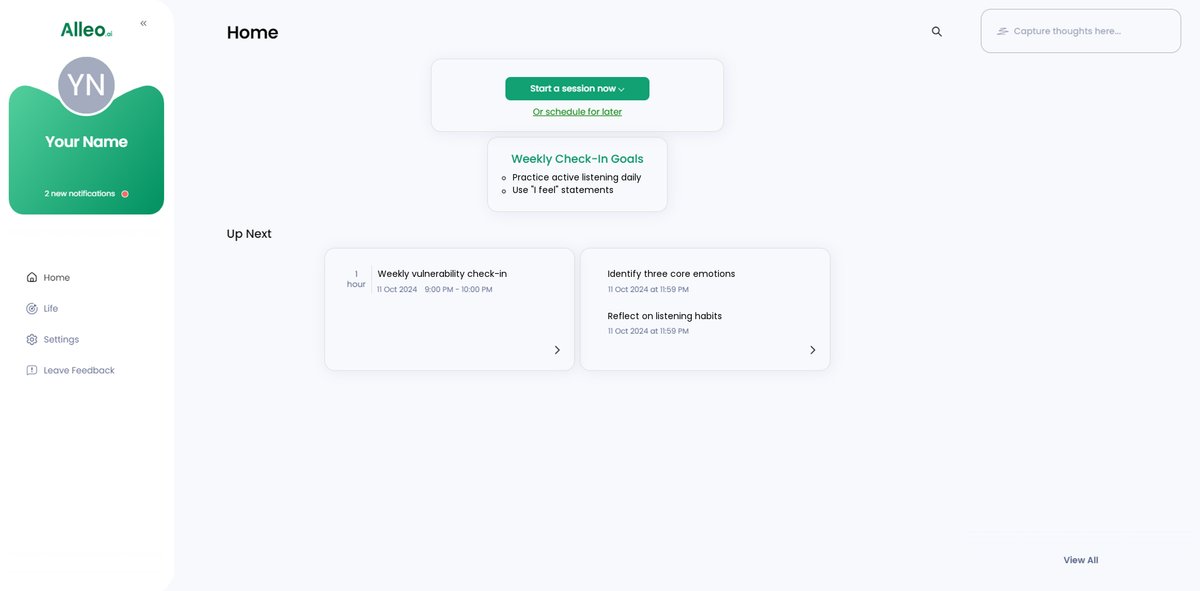
Step 6: Adding events to your calendar or app
Use the app’s calendar and task features to schedule and track your progress in practicing vulnerability exercises, such as active listening sessions or using “I feel” statements, helping you stay accountable and measure your growth in communicating more effectively in your relationship.
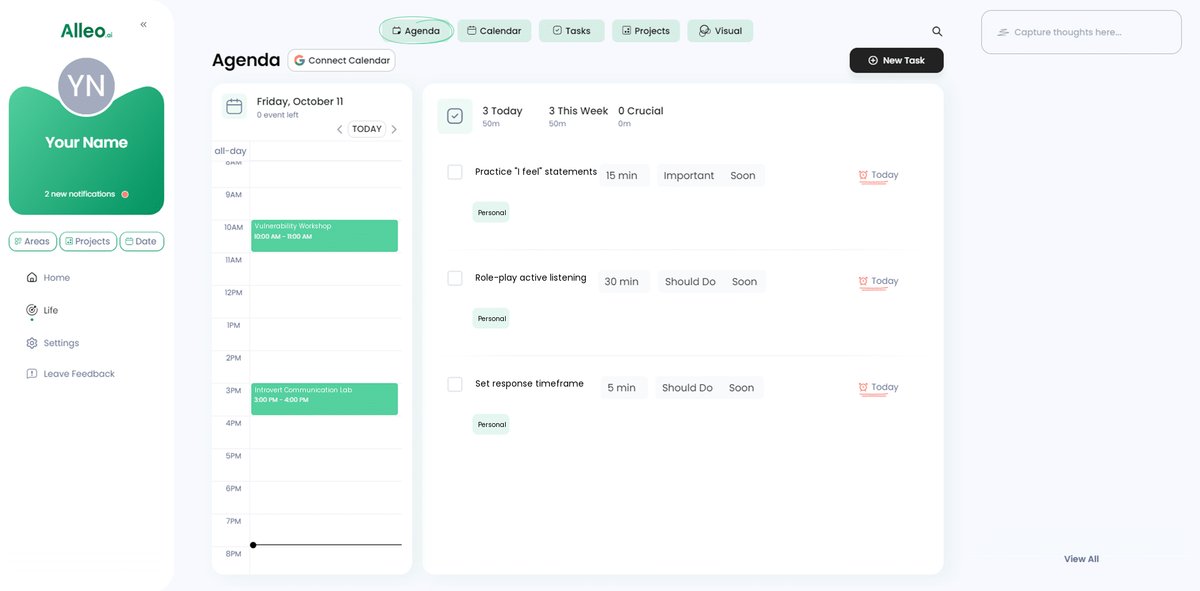
Embracing Vulnerability: Your Path to Deeper Connections
As we wrap up, let’s reflect on the journey we’ve taken together in exploring expressing vulnerability for introverts.
Communicating vulnerability can be challenging, especially for introverts. But with the right introvert communication strategies, you can express your needs effectively.
Remember to practice active listening, use “I feel” statements, and set clear boundaries. These steps will help you build stronger, more trusting relationships through vulnerability for introverts.
I understand how daunting this can feel for quiet individuals. But, you’re not alone in overcoming social anxiety in personal interactions.
You have the tools now for authentic communication skills as an introvert. Start using them today.
And remember, Alleo is here to support you in expressing emotions as an introvert. Try it for free and see the difference it can make.
Believe in your ability to connect deeply. You’ve got this!